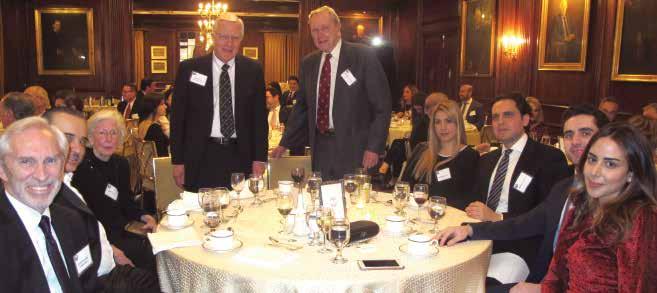
4 minute read
IC, Rugby and Syria
This wasn’t just another sports field for the five Syrian coaches who arrived at IC in February to take part in a rugby training session. It wasn’t just any workshop and certainly not just any certificate. For whatever they would learn right here at IC, will earn them the much needed Level 2 Coaching Certificate – and help provide an official path towards becoming full members of Asian Rugby. A boost they, greatly need in war-torn Syria.
Among them was UN engineer, Mohamed Jorda. “We are here so our coaches will go back and take our teams to a new higher level,” he explained. The sport was introduced in Syria in 2004 and then rapidly grew during the war as more teams formed.
It was only last year that, as the Secretary-General of the Higher Syrian Rugby National Federation, he was invited to a rugby game taking place in Sweida.
Cautiously, Jorda made his way to Sweida. He had heard that the roads were safe despite the imposing presence of checkpoints. Still, he was too curious and too ecstatic not to go. It would be the first rugby game ever held in Sweida. Rugby wasn’t a national sport in Syria by any means. In fact, many Syrians had never heard of it. So will anyone even show up to the game?
There, Jorda stared in disbelief. The stadium was full of onlookers. Hundreds of them. Their cheers could be heard for miles. Sweida had pulled it off. It officially had its own rugby team and, moreover, a now recent spinoff: an under-20 boys’ and girls’ team.
Their coach and founder is 20-year-old Bassel al Halabi, a 4th year engineering student. “I know it is not a popular game in Syria”, he said. “But I have always loved it and watched it on TV.”
An avid athlete, he was approached by the Syrian Rugby Federation last year. How would he feel about starting a rugby team in Sweida?
Al Halabi got his friends together. After two months of training, they had a team.
Soon enough, his team was playing others from Damascus. One of them was Imad Kobeissi’s team, a dentistry student in Damascus. The 22-year-old grew up watching American football on TV and immediately joined the university rugby team. He soon fell in love with it and before long became the coach of his own team. “We need outlets,” he said. “We need to run and tackle. This alone lets out the stress. It is helping us cope with this pressure around us. ”
The ultimate goal: to reach the highest level in rugby certification. And thus the arrival – thanks to the funding of Asia Rugby and the organization of the Lebanese Rugby Union Federation - of the five Syrian rugby coaches to IC, to take part in the four-day Coaching the Coaches Training Workshop (Level 2).
While rugby was introduced in Syria in


2004, the Beirut Phoenicians rugby team was created in the 1990s, by brothers Alex and Mike Jammal. The team played their first game against a British warship. Today, there are four other Lebanese rugby teams and five school teams across the country including IC.
“Now we are trying to become a member of the World Rugby Team,” explained Steven Wrigglesworth, the National Coach of Lebanon Rugby who lives in Cyprus and came over for the training session. “We are trying to shape and develop Lebanese rugby for the future and there are many challenging requirements to meet.”
“It is important for the IC rugby squad that we follow rugby’s core values and strengthen our rugby community with good relationships with other players, teams, and nationalities,” said Richard Bampfylde, Head of Rugby at IC. “During difficult times, rugby, and sport in general, can be a great relief. We have seen how our own IC students find it a great stress reliever from their academic demands.”
The Rugby Workshop was attended by coaches and trainers from various countries including Lebanon, Syria, Jordan and Tunisia.
Our goal is to keep the flame going,” said Jorda. “This sport is bringing people together. People come to see the teams play because they want to be happy. They want to cheer us on. They are tired of the war. If we stopped playing rugby, the game will end there. It is up to us to keep it going. And this is what we are doing by coming here.”
And, very softly, he continued, “and every year we say that tomorrow will be better…”












